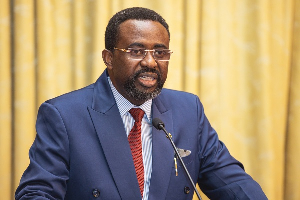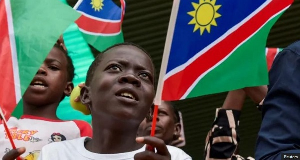Accra, March 12, GNA - Although Ghana prides itself as the first country to ratify the United Nations Convention on the Rights of the Child, it has to date not ratified the International Labour Organisation (ILO) Convention on the Minimum Age to Work.
The ILO Convention 138 of 1973 stipulates that children could only be engaged in employment upon completion of basic education or at least have attained the age of 15 years.
The ILO Conventions has, however, been incorporated into the Children's Act of Ghana, Act 560, Madam Margaret M. Sackey, Senior Programme Officer of the International Labour Office, said on Monday. She was speaking at the opening of a three-day workshop on Worst Forms of Child Labour (WFCL) and State of Human Rights Monitoring in Ghana which opened in Accra for about 40 participants of the Commission on Human Rights and Administrative Justice (CHRAJ).
The workshop seeks to build the capacity and expertise of the Commission's Investigators and Public Education Officers in the application of Alternative Dispute Resolution (ADR) methods in handling child labour cases.
The workshop which drew participants from all the 10 regions also seeks to promote effective public education and advocacy skills and help develop a monitoring and reporting format.
Madam Sackey said Ghana's inability to ratify ILO Convention 138 of 1973 was a dent on its image since there were only seven countries left that were yet to ratify the convention and most of the seven countries were those that had been hit by conflicts of all sorts. She said the focus for ILO now was the immediate prohibition and elimination of the Worst Forms of Child Labour (WFCL) for all children under the age of 18.
"The ILO office in Ghana has adopted and is implementing a time bound programme to eradicate WFCL in the shortest possible time," Madam Sackey said.
She listed eight time-bound WFCL being implemented in Ghana to include Ritual Servitude, otherwise known as trokosi, trafficking, Kayaye, child domestic servitude, commercial sexual exploitation of children, children in quarrying and small-scale mining (galamsey), children in fishing and children in commercial agriculture.
"As at now, we are working in nine regions, with the exclusion of Upper West, because there was no proposal from that region," Madam Sackey said.
She said the role of CHRAJ in this project included awareness creation, law enforcement agency partner, alternative dispute resolution agency, the application of relevant laws and the integration of child labour interventions into district plans and programmes.
"As a global demand, all children should be kept from small-scale mining sites by 2015," she said, adding that, the ILO office in Ghana was working at preventing 9,000 children from being exposed to WFCL. "We are also working with some NGOs who have helped to withdraw about 2,093 children from WFCL as at the end of February last month," she added.
Mrs Chris Dadzie, Director of Public Education of CHRAJ, said the goal for now was to eliminate WFCL towards the eventual elimination of child labour in Ghana.
The workshop is being sponsored by the ILO. 12 March 07
General News of Monday, 12 March 2007
Source: GNA
















